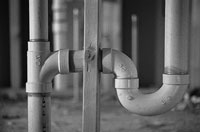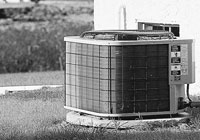|
Unit 2
: Lesson 2: How to find the right home
Looking further
Getting a home inspected
 When you find a house that seems “perfect,” beware!
It may have hidden problems. Never buy a house before it
has been carefully inspected. Otherwise, what seems like
your “dream house” could make you unhappy later.
When you find a house that seems “perfect,” beware!
It may have hidden problems. Never buy a house before it
has been carefully inspected. Otherwise, what seems like
your “dream house” could make you unhappy later.
Doing your own inspection first
You can do the first level of inspection
yourself. Pay attention to ceilings, walls, and floors.
Cracks may indicate that there are structural problems.
Make a list of questions to ask the real estate agent and
owner about the structural soundness of the house. For example:
When was the roof last replaced? What material was used?
Is the electrical system sound? Does the plumbing system
include any old lead pipes? (They may be unsafe.) By law,
both the seller and the real estate agent must tell you
about any problems they know about in the house.
Finding a home inspector
Most people also have a home inspection
done by a qualified home inspector. The inspection usually
takes place after you have made an offer and signed the
contract on your house. Most sales contracts, however, contain
a contingency that states that the final contract
agreement can change if major problems are uncovered during
the home inspection.
You are responsible for finding and paying
the home inspector. Although you can usually expect to pay
from $200 to $300 for the service, many people find it is
well worth the money to make sure the house is sound before
the final purchase.
One of the best ways to find a qualified
inspector is through recommendations from people you know.
You can also look in the Yellow Pages under “Building
Inspection Service.” You should ask the service for
the names and phone numbers of three recent clients. Call
these references to check on the inspector’s quality
of work. You can also call the American Society of Home
Inspectors at 1-800-743-2744 to get the names of inspectors
in your area. Inspectors who belong to this organization
must follow careful standards to become a member.
 What
the inspection should include What
the inspection should include
Every inspection should include an evaluation
of at least the following:
- foundations;
- doors and windows;
- roof and siding;
- plumbing and electrical systems;
- heating and air-conditioning systems;
- ceilings, walls, and floors;
- insulation;
- ventilation;
- septic tanks, wells, or sewer lines;
and
- common areas (e.g., in condominiums).
 Using
the inspection report Using
the inspection report
The inspection report is not meant to
tell whether you should buy the house or how much you should
pay for it. If problems are found, it should give you some
idea how much it will cost to repair them. If serious problems
are found, you have the right to cancel the purchase agreement
and get a refund on your deposit. You can also ask the seller
to reduce the purchase price to cover the cost of repairs.
Or you may be able to negotiate with the seller to make
the needed repairs.
Previous
Page | Next Page
|